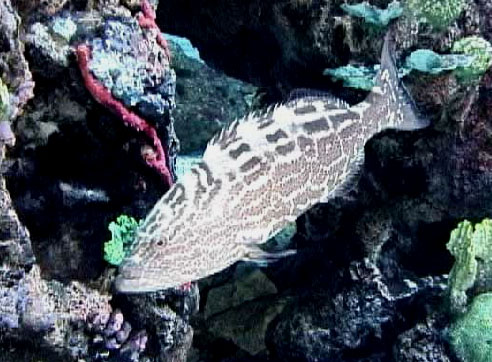|
| Query: shrimp | Result: 233rd of 410 | |
Black Grouper (Mycteroperca bonaci) - Wiki
| Subject: | Black Grouper (Mycteroperca bonaci) - Wiki
| |

| Resolution: 492x362
File Size: 69260 Bytes
Upload Date: 2006:12:25 13:01:40
|
Black grouper
From Wikipedia, the free encyclopedia
[Photo] Black grouper (Mycteroperca bonaci) from the USGS. http://cars.er.usgs.gov/pics/coral/coral/coral_2.html
The black grouper (Mycteroperca bonaci) is one of the best known of the large group of Perciform fish called groupers.
The black grouper is a large marine fish, growing up to 150 centimetres in length and 100 kilograms in weight. It has an olive or gray body, with black blotches and brassy spots. The preopercle is gently rounded. It is associated with rocky or coral reefs but is not dependent on them; it is found in the Western Atlantic Ocean, from Massachusetts, USA, in the north to southern Brazil, but is particularly associated with the southern Gulf of Mexico, the Florida Keys, the Bahamas and the Caribbean. Adults are not found at the northern extremes of its range. It lives mostly near the surface, at depths ranging from 6 to 33 meters.
The black grouper is quite tasty and an important food fish, is fished for sale but also for sea-angling. While not currently considered endangered, it is vulnerable to increases in exploitation because it is a relatively slow breeder.
The black grouper is a solitary fish. Adults feed mainly on other fish and squid, though adults feed on crustaceans especially shrimps.
The fish spawns between May and August. It is a protogynous hermaphrodite, i.e. the young are predominantly female but transform into males as they grow larger.
There are other fish that are sometimes called "black groupers". These include the similar gag grouper, Mycteroperca microlepis, the misty grouper Epinephelus mystacinus, and the critically endangered Warsaw grouper Epinephelus nigritus.
http://en.wikipedia.org/wiki/Black_grouper
| The text in this page is based on the copyrighted Wikipedia article shown in above URL. It is used under the GNU Free Documentation License. You may redistribute it, verbatim or modified, providing that you comply with the terms of the GFDL. |
|
^o^
Animal Pictures Archive for smart phones
^o^
|
|